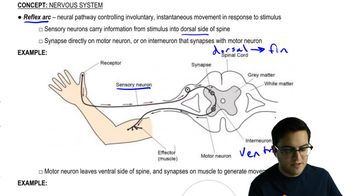DRAW IT The reflex that pulls your hand away when you prick your finger on a sharp object relies on a neuronal circuit with two synapses in the spinal cord. (a) Using a circle to represent a cross section of the spinal cord, draw the circuit. Label the types of neurons, the direction of information flow in each, and the locations of synapses.
 Verified step by step guidance
Verified step by step guidance
Verified video answer for a similar problem:
Key Concepts
Reflex Arc

Types of Neurons

Synapses

After suffering a stroke, a patient can see objects anywhere in front of him but pays attention only to objects in his right field of vision. When asked to describe these objects, he has difficulty judging their size and distance. What part of the brain was likely damaged by the stroke? a. the left frontal lobe b. the right frontal lobe c. the right parietal lobe d. the corpus callosum
Injury localized to the hypothalamus would most likely disrupt a. regulation of body temperature. b. short-term memory. c. executive functions, such as decision making. d. sorting of sensory information.
DRAW IT The reflex that pulls your hand away when you prick your finger on a sharp object relies on a neuronal circuit with two synapses in the spinal cord. (b) Draw a simple diagram of the brain indicating where pain would eventually be perceived.
